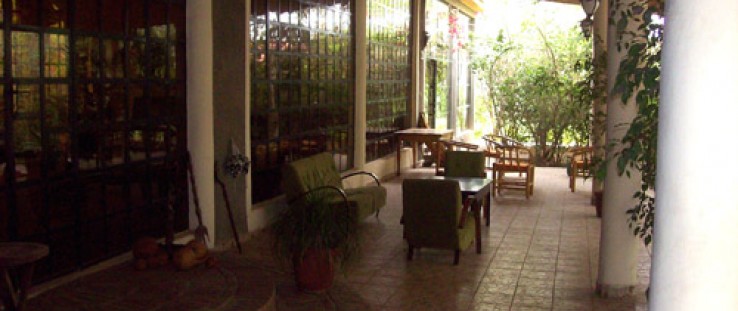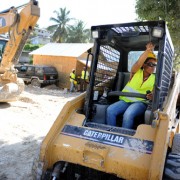 Joseph Obi, USAID
Joseph Obi, USAID
 Joseph Obi, USAID
Joseph Obi, USAID
While women across the developing world thrive thanks to microfinance—small loans that beget small, though often profitable ventures—Kelly Yohannes dreamed on a larger scale. She wanted to build an upscale, environmentally friendly hotel in Ethiopia, where she lives.
But for that, she needed a large amount of financing from her local bank. It did not take long for Yohannes, a widow who had shared her hotel dream with her late husband, to realize that women like her face extreme difficulties accessing financing.
Three years ago, USAID decided to do something about the challenges would-be entrepreneurs like Yohannes face by partially sharing loan risk with a bank in Ethiopia. With a USAID guarantee, the bank agreed to start lending to women seeking loans for small- and medium-size enterprises, opening the door to credit for Yohannes and other female entrepreneurs in Ethiopia.
To date, USAID has guaranteed over $4 million in loans for women borrowers in Ethiopia as well as Ethiopians returning to the country after living abroad. The entrepreneurs run the gamut, from hoteliers to flower farmers.
The Confidence Gap
A lack of confidence towards private-sector borrowers is common not only in Ethiopia but throughout the developing world. While banks in the United States and other developed countries tend to have low amounts of cash on hand in order to maximize lending, banks in developing countries are much more conservative and prefer to keep most of their money in safe treasury accounts or bonds.
When these risk-averse institutions do decide to lend, they often require that borrowers present collateral totaling 200 percent of the amount of the loan they are seeking. It is this lack of collateral that profoundly impacts women, who are often discouraged from owning property due to cultural and social norms. It is, in fact, one of the most significant factors driving the inability of women-owned businesses to access commercial bank finance.
After USAID established a loan guarantee with the Bank of Abyssinia in Ethiopia in 2008, Yohannes found the bank suddenly willing to take a chance on her business plan. Her perseverance was awarded with $550,000 in loans.
With credit in hand, she purchased an 11,000-square-meter plot of abandoned land in the town of Adama and began the laborious process of clearing the area for construction. Most construction projects of this magnitude are completed in seven years, but between USAID's technical assistance and Yohannes' dedication, her hotel was open for business just two years later.
Gardens, Dignitaries, and Poultry
Since Kelly's Retreat opened in early 2010, it has hosted several dignitaries, including former heads of state, first ladies, and a delegation of Nigerian government officials. The hotel centers around a large reception room, library, board room, and tea lounge for guests seeking to get away from the main city. The 22 eco-friendly suites all open up to dense gardens comprised of 1,000 diverse species of flora. In addition, the hotel has won several awards for environmental compliance and quality control.
Every day, Yohannes travels three hours round-trip from her base in Addis Ababa to ensure the hotel is operating smoothly and to supervise her 67 full-time employees.
"My husband and I had vowed to establish an intellectual and cultural center, unlike any hotel in East Africa, which would showcase Ethiopia in a positive light, but also have influences from various cultures around the world," said Yohannes.
Her story is not atypical. Asegedech Meshesha grew up in Ethiopia but long ago moved to the United States, where she became a naturalized citizen. She successfully raised her family in the United States, but when she learned that she could qualify for a loan to start a business back home, she jumped at the opportunity. She had grown up around chickens and knew she could help people in Ethiopia by establishing a poultry farm. In Ethiopia, chicken is usually imported and, therefore, cost prohibitive to all but the wealthy. After receiving $87,000 in working capital loans in 2008, she gradually built her farm, which now boasts 2,800 chickens that produce 1,350 eggs a day.
A Credit Legacy
Since 1999, USAID's Development Credit Authority has helped 87,000 entrepreneurs—including 33,000 women—realize their dreams through partial loan guarantees. By enabling banks and other financial institutions to "test" new borrower sectors, the Agency is working to change the behavior of hundreds of banks and thousands of loan officers around the world.
As banks realize that business ventures they once perceived as risky are in fact profitable, they gain confidence in these new sectors and borrowers. In Ethiopia, the proof is in the numbers. There have been zero defaults, meaning USAID has not paid any claims to Bank of Abyssinia for the loans.
"By encouraging lending to female entrepreneurs, USAID helped the bank identify a profitable sector," said Sehul Truesaw, who works with USAID to provide technical assistance and helped Kelly Yohannes secure her loan. "More importantly, women now have a channel of credit to establish the businesses of their dreams."










Comment
Make a general inquiry or suggest an improvement.